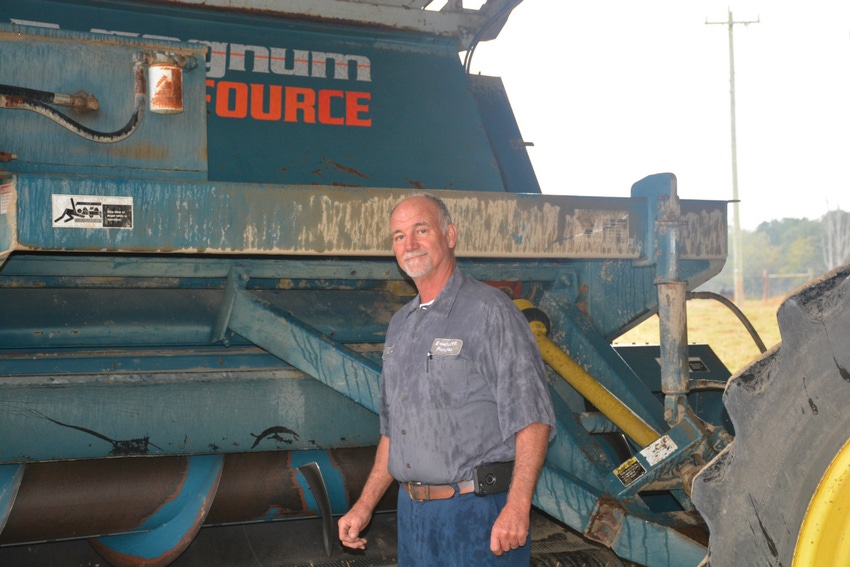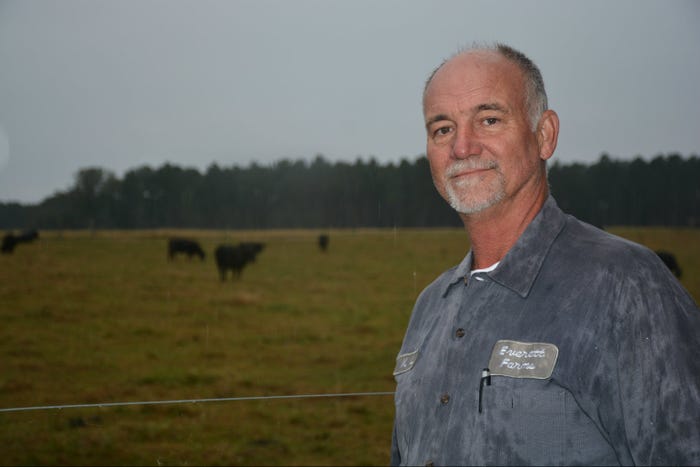
Virginia farmer M.L. Everett, Jr. looks to the generations who preceded him on the family farm with a sense of both reverence and gratitude: Reverence for what they achieved and gratitude for what they have allowed him and his family to achieve.
“We have been blessed by previous generations to continue on,” the fourth-generation farmer said on a rainy October morning at his farm office near Capron in Virginia’s Southampton County.
“We couldn’t have done what we have had it not been by for my grandad who struggled through the Great Depression, giving us a start. I couldn’t have done it without my dad who worked hard accumulating land and giving me a start. I’ve been able to expand on that and give my son Lewis a chance to jump into a business that is already growing. We have been blessed,” he says.
Today, M.L. Everett, Jr. and his son, M.L. Everett, III, known as Lewis, run two farming operations, Everett Farms Incorporated, owned by M.L and his wife Jeannette; and Pine Circle Farms, LLC, owned by Lewis. M.L.’s father, M.L. Everett, Sr., is retired at age 88, but is still involved and gives much needed guidance to both son and grandson.
“Dad will be 89 in January. He still goes by the fields to make sure everybody is working, and he is still a motivator. Farming is still in his heart and he wants to make sure we do what we need to do to be successful,” Everett says.
The two Everett farming operations total 2,000 acres. This year’s mix included 1,200 acres of cotton, 300 acres of peanuts, 400 acres of soybeans, 150 acres of corn (mainly for rotation), and 160 acres of wheat for cover crop as well as 50 head of cattle and timberland. The family owns 23 percent of the cropland they work.
Everett’s great- grandfather Carter Everett laid the groundwork for the generations to come as a tenant farmer. Everett’s grandfather, Willie Everett, bought land and started farming in Southampton County during the great Depression with 52 acres. He also ran a country store and trapped to make ends meet during those hard times. It was a period when banks would take your land, even if you missed one payment, so it was struggle.
Willie passed the 52 acres of land to his son who was able to expand the operation after he returned from service in the Korean War. “Dad was a sergeant in the military police in Korea. He came back with a military mentality that everything should be organized and click just like that. This approach helped him be a success on the farm,” Everett says.
Everett got his start in farming at age 13 when he sold his first litter of pigs. In high school, he excelled in athletics, football, basketball and baseball. After high school, he went to North Carolina State in Raleigh for a two-year degree in livestock technology. He returned to the farm in 1977 where he was able to use his degree to expand the family hog operation.
By 1997, the genetics of hogs that Smithfield Foods needed made it too expensive for small hog producers to make a profit and their hog houses needed to be updated to remain competitive, so the family decided to get out of hogs and return to cotton since the boll weevil that ran his dad out of the cotton business in the 1950s had been eradicated. Everett says he and his dad were happy to be out of the hog business and knew cotton would be a great complement to their peanut acreage.
They have successfully grown cotton ever since.
Everett notes that cotton is still the most challenging crop he produces. He emphasizes that the crop cannot be micromanaged to success.
“If you take that approach, it will get you in trouble. Sometimes you can’t get to the crop at the exact time it needs something. You can’t micromanage each field. You have to look at your total acreage and manage as a total acreage, and not micromanage each section,” he explains.
“Peanuts are a little bit easier to manage because the genetics of peanuts haven’t changed as much as cotton has,” he adds.
Like other cotton farmers, Everett points out that varietal selection is more of a challenge these days because of the continuous release of new varieties each year. When it comes to variety selection, soil type and nematode pressure are two of the top criteria the family considers.
“We do nematode assays. Some cotton varieties have resistance to nematodes, so that’s advantageous,” he says.
For peanuts, the family produces both Virginia-types and runners. They are seed growers for Birdsong which mostly requires high-oleic varieties which presents more of a challenge to make the same yield as non-high-oleic peanuts . The family raises Sullivans, a high-oleic Virginia cultivar, and TUFRunner 511, a high-oleic runner variety. The family also grows the Virginia variety Bailey on their farm.
“TUFRunner is a very good yielder for us. It takes less calcium than a Virginia cultivar like Sullivan so there is a little money savings there. Sometimes, we are able to use one less fungicide spray on runners. TUFRunner is a smaller seeded variety so we are able to use fewer pounds of seed per acre, which also makes it economical to grow,” he says.
“Runners, being smaller than Virginias, don’t pull off as easy in the digging process versus the larger Virginia peanuts. If the weather gets adverse on you and you are a week late in digging, the runners tend to hold onto the vine a little bit better,” he adds.
Contact prices are lower for runners than Virginias, but they can yield better — which makes a difference — and input costs are lower. Everett notes that both peanut types now yield about 5,000 pounds per acre on their farm.
“Eight years ago, we thought if we made peanut yields of 4,000 pounds per acre we had hit a home run. Since then, we have set our goals higher and are disappointed if we don’t make 5,000 pounds per acre. That’s our goal now,” he says.
The Everetts like long peanut rotations and like to control resistant weeds in their cotton so they won’t be an issue in peanuts when the crops are rotated. “We try to keep our cotton fields clean so when we do rotate back to peanuts, we don’t have a weed that is hard to control. Our weed management program is to try to have clean fields for the next crop we’re going to grow,” he says.
“Since peanuts are not Roundup Ready, you have to use different chemistries in your herbicide program to control weeds. We don’t have many Palmer amarnath weeds, but if Lewis and my nephew Trevor are spraying and see a Palmer amaranth, they’ll stop the sprayer, pull the Palmer out by hand and throw it in the woods,” he says. “Our biggest Roundup Resistant weed problem is ragweed. It’s very easy to see in the field so we pull them up by hand and throw them in the woods too.”
Peanuts allow them to use herbicides to clean up the Roundup resistant ragweed which helps with their cotton. And they use atrazine in their corn rotation which also helps with the problem.
Both M.L. and Lewis see the value of farm organizations and devote their time to them.
Lewis serves on the board of Southern Cotton Growers and is an alternative delegate from Virginia for the National Cotton Council. He is also president of the Virginia Cotton Growers Association. He also serves as vice-chairman of the Ag Leadership Council for the Tidewater Research Center in Suffolk.
M.L. is on the board of Virginia Farm Bureau, representing District 13, which includes Dinwiddie, Charles City, Greensville, James City, New Kent, Prince George, Southampton, Surry, Sussex and York counties. He chairs the Virginia Farm Bureau Peanut Advisory Committee and Cotton Advisory Committee.
He is also chairman of the youth development board for the State Fair of Virginia and serves on the Commonwealth Fairs & Events Oversight Committee. He is past president and serves on the board of the Southampton County Farm Bureau.
He currently serves on the boards of the Virginia Peanut Growers Marketing Association, the Chowan Basins Soil and Water Conservation District and Virginia Crop Improvement Association. He previously served on the boards of the Virginia Peanut Growers Association and Virginia Cotton Growers Association.
Timely passage of the farm bill is a concern for Everett. He says it is vital to have the farm bill passed by December. In years past, when the farm bill was passed in the spring, planning for the next crop was a challenge.
“This farm bill could change the whole way I look at the management of this next year’s crop. We need to get the farm bill passed so we will know what the rules of the game are going to be. We need the farm bill early enough to plan,” he says.
In addition to son Lewis, M.L and Jeanette have another son, Thane, who works as an engineer at the U.S. Naval Surface Warfare Center in Dahlgren. Both Lewis and Thane earned their bachelor’s degree from Virginia Tech. Jeannette is the deputy commissioner of revenue in Southampton County.
M.L.’s nephew, Trevor Snyder, works with M.L. and Lewis in the farming operation and the family has one full-time employee. Like M.L, Trevor earned a two-year degree at North Carolina State with majors in ag business, field crops technology and general agriculture.
And the good news is that Lewis’s son Sawyer, age 7, has expressed interest in the farm. Everett hopes his grandson will be the sixth generation to farm the family land in south central Virginia.
“Sawyer is the spitting image of his dad,” Everett says with a smile.
At age 62, M.L. has turned over about 85 percent of the management decisions to Lewis who is 40. They still use a team approach and still seek the wisdom and guidance of M.L.’s dad. “Dad is still a very important part of this operation,” he says. “His opinion means a lot. He has the wisdom of years and experience,” Everett. says.
Everett. makes it clear the farm is a family operation all the way. His mother Betty still keeps the books at age 83. “She makes sure nothing is paid without a signed receipt. She is a stickler for every penny,” he says.
Jeannette is an active partner in the farm as well. “She keeps all the records of the farm on Quick Books. We truly have a family-run business with all family members contributing in their own way,” Everett says.
Through it all, Everett. says it’s their faith in God that keeps them going.
“I don’t know of any farmer who doesn’t have a strong faith,” he says. “You plant a seed and it germinates and goes into a reproductive stage. You have to thank God for the weather and thank Him for the seed that has sprouted,” he says. “I have to give God the credit for where we are today, for what we worked hard to obtain. Through hard work and God’s will, we were able to accomplish so much.”

In addition to producing cotton, peanuts, corn, soybeans and wheat, the Everett family raises 50 head of cattle on their south-central Virginia farm.
About the Author(s)
You May Also Like






